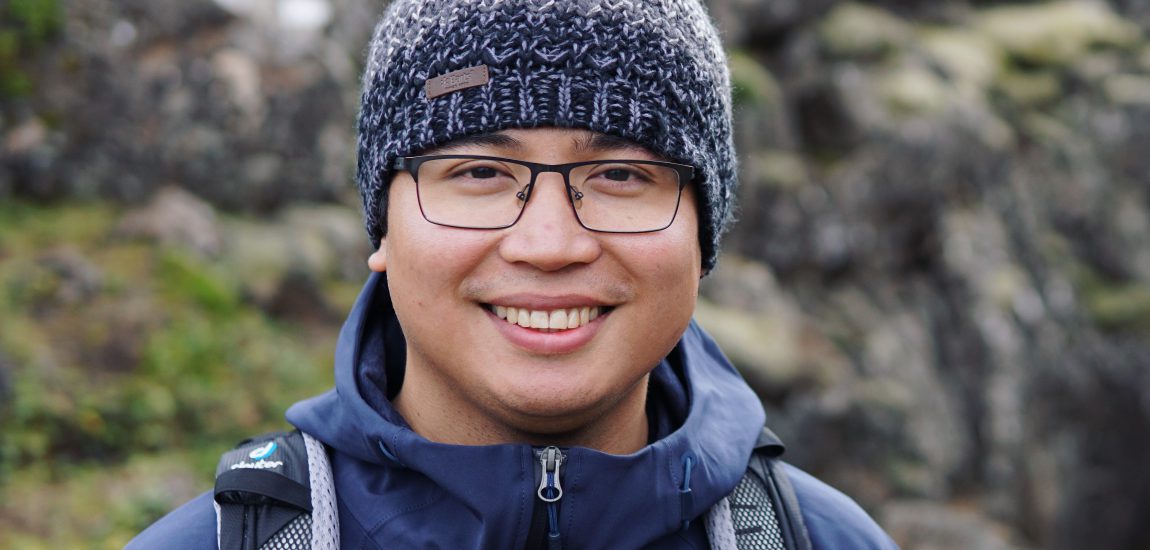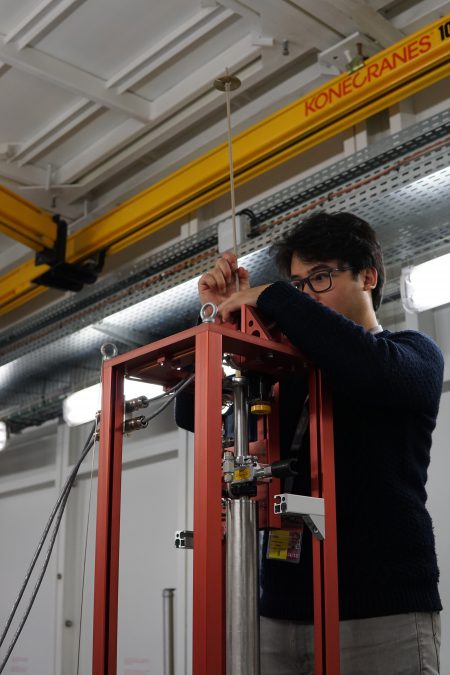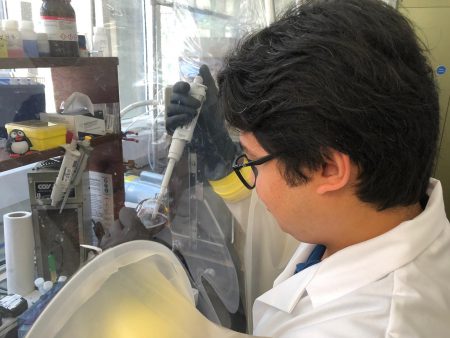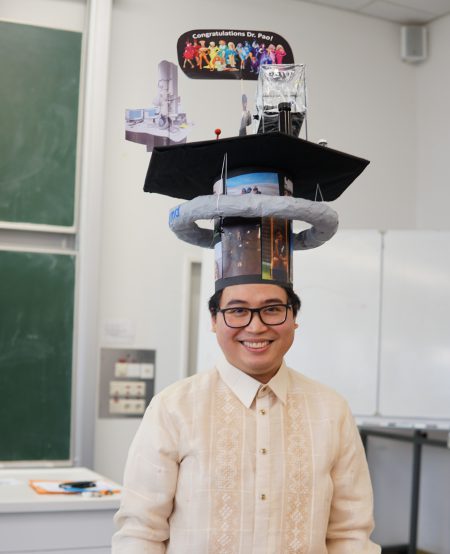
People’s profiles – Jeffrey Paulo Perez

GFZ German Research Centre for Geosciences, Germany
Jeffrey’s current research is focused on iron redox (geo)chemistry in natural and engineered environments. His postdoctoral research focuses on molecular scale mineral-organic matter interface processes in Arctic soils.
Specifically, Jeffrey is interested in elucidating the mechanisms and pathways of the formation and transformation of iron-bearing minerals. How do these processes affect the cycling of nutrients (e.g., P, Si) and contaminants (e.g., As, Cr) in oxygen-poor environments. He combines several state-of-the-art analytical techniques from nanoscience, materials chemistry, and geochemistry. This approach allows him to gain fundamental understanding of the complex interplay between mineral surfaces and nutrients / contaminants at the nano- and molecular-scale.
What field do you currently work in and what is the job title of your current position?
I’m a postdoctoral scientist working in the field of environmental geochemistry. Currently, I work in the Interface Geochemistry Section at the GFZ German Research Centre for Geosciences.
Describe your qualifications and career path to date.
I studied BSc Chemical Engineering at the University of the Philippines Los Baños and graduated in 2012. Afterwards, I worked as an instructor in the same university and taught undergraduate general engineering courses. I started looking for graduate opportunities in Europe during my last year as an instructor in the university. In 2014, I received a full MSc scholarship from VLIR-UOS to study Environmental Sanitation (now Environmental Science and Technology) at Ghent University in Belgium. After finishing my MSc in 2016, I started my PhD in Earth Sciences (Geochemistry) at GFZ and the Freie Universität Berlin under the framework of the “Metal-Aid” Innovative Training Network funded as a cooperative program through the European Commission. I defended my PhD in January 2020, and then started my postdoc at GFZ.
If you are the first person in your family to attend or work at a university please summarise the importance that this has to you.
I was not the first one in my family (among first cousins) to finish a bachelor’s degree (usual minimum educational qualification for work). But, I was the first one to study in the University of the Philippines, which is the national state university. This was very important to my family because that meant that I could get a good job after my BSc studies.

Have you moved countries to pursue and build your career, networks, and credentials?
I moved from the Philippines to Belgium in 2014 for my MSc. And then, I moved to Germany in 2016 for my PhD, and now my postdoc.
What aspects of your ethnic and cultural background are important to you personally?
As a Filipino, I would say I’m proud of my cultural heritage. I was a member of a cultural / folk dance company during my undergrad, so naturally traditional Filipino clothing, music and dances are all important for me. I also love cooking and would always cook traditional Filipino food so that I can have a taste of home even if I’m far away.
How would you describe your gender identity and / or sexual identity?
I’m a cisgender gay man.
If you have a partner working in any sector / role, are you both happy with the domestic and professional balance possible for both of your independent careers to date (present, past, future, or alternating)?
My partner is just about to finish his PhD, so I was glad that he joined me in Germany last year after being in a long-distance relationship for almost 4 and a half years. As a non-European, I do not have so much flexibility in terms of choice of work location. I’m really grateful because he understands this limitation for me and moved here.
If you were not presently in your current job, what alternative career might you have?
After my MSc, I briefly considered working as a consultant in the field of sustainability and circular economy.
Summarise how many hours do you work in a week, and / or describe a typical day at work. What is your level of overall satisfaction in your current job?
I usually work between 40 and 45 hours per week (no weekends). I got severe anxiety in the middle of my PhD, so I worked hard to have a more balanced domestic and work life. I would say I’m very happy with my current job. I’m really enjoying guiding and mentoring PhD students in our group. My typical day at work (which is of course limited due to COVID limitations) would be split between guiding PhD students (they just started with their first experiments) and my own research project.
If in academia, do you work directly with partners in government, private-sector, creative industries, spiritual groups, native peoples and materials / areas important to their cultures, and / or professionals involved in lobbying or policy development?

During my PhD, I was involved in a European Innovative Training Network (http://metal-aid.eu/) that is part of the Marie Sklodowska-Curie Actions program, and we had partners from the government and industry (consulting firms). Through our project partners, we were able to study contaminated sites (https://www.danishsoil.org/testsites/index.php). Our results are being communicated to politicians via our government partner to evaluate the revised estimates of necessary efforts and costs for remediation.
What are the most enjoyable aspects of your job and what do you like most about your working environment?
I think the most enjoyable aspects of my current postdoc at GFZ are good research management / leadership, working with colleagues from different parts of the world (11 countries) and opportunities for mentoring students.
If your work involves teaching and training others, what do consider are the highlights?
Since GFZ is not a university, we do not usually have a lot of teaching opportunities. In our group, however, the postdocs are very hands-on in terms of mentoring our interns and PhD students. This provides us with opportunities to hone our mentoring skills and to train the next generation of scientists.
What opportunities does your job provide to be creative and / or to take initiative?
I’m thankful to our research group leader for giving us postdocs the freedom to take initiative in building our own collaborative research network and to explore novel research ideas.
Given the COVID-19 crisis of 2020-2021, how did you manage your work during this time and in what ways do you feel your productivity and outputs were enhanced or diminished?
I would say that COVID-19 has really affected my work during the last year. I just started my postdoc a month before the lockdown here in Germany. All of my planned fieldwork activities last year were cancelled, and I’m afraid that the next one in late spring / early summer will also be cancelled. Despite these setbacks, the pandemic has allowed me to attend various research seminars, workshops and conferences online that otherwise would not have been accessible for me before. These unusual circumstances that we all find ourselves in have also provided me opportunities and much needed time to learn new things in preparation for my postdoc research.
Is there a key event, experience, or person that has particularly inspired and empowered you? Do you have a favourite moment in your career?
One of the most inspiring moments in my career is probably coming across the story of Prof. David K. Smith (University of York) and how his husband Sam inspired his research. I also consider him as one of my science heroes because of his work to advance LGBT+ visibility and diversity in the chemical sciences.
We are very thankful to Jeffrey for this constructive contribution.
Editorial handling was by EAG DEI Committee members Amy Riches and Jabrane Labidi.
